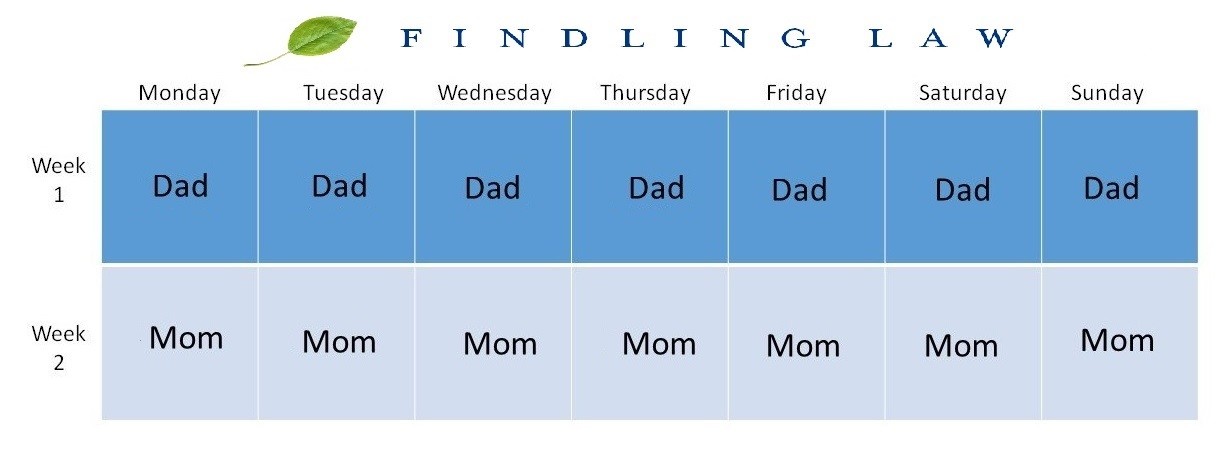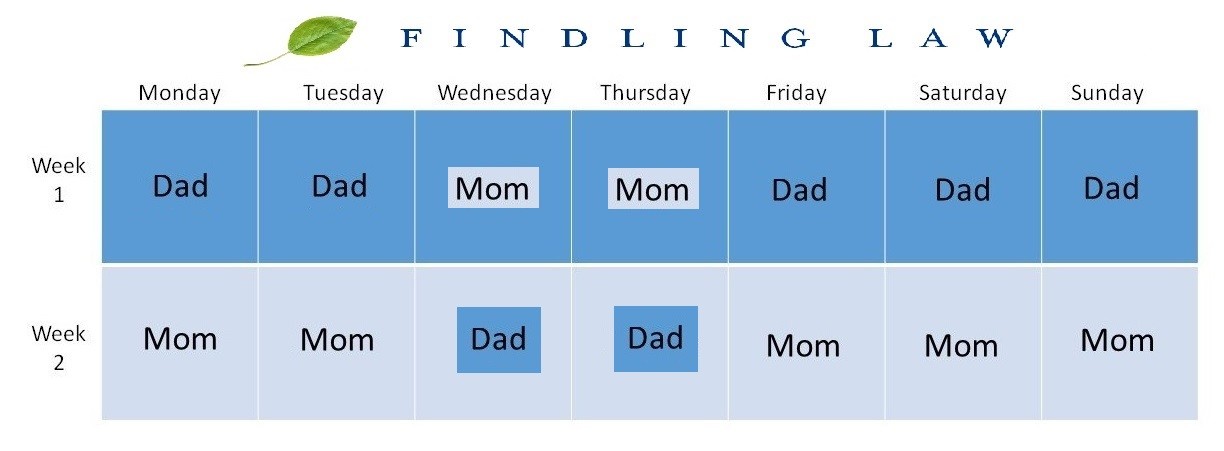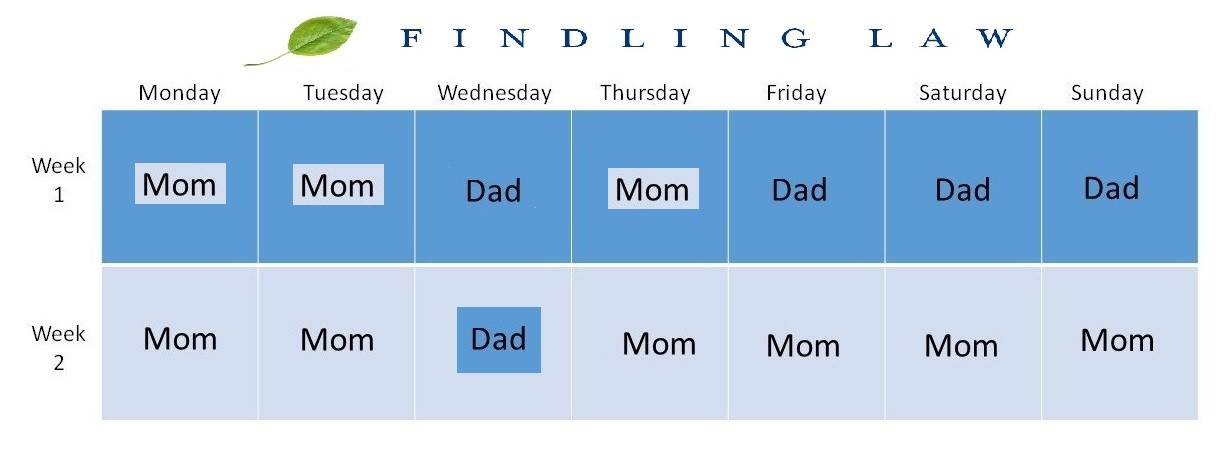Parenting time or visitation is similar to child custody and describes the frequency of time a child spends with each parent. We invite you to explore our knowledge base.
Parenting time Resources
We provide exceptional representation and can help you manage your situation.
Quick Navigation – Parenting time
Sometimes the biggest challenge in a divorce or custody case is deciding when a child will spend time with each parent. Parenting time (formally visitation) is the legal term used to describe simply that time and in this article we discuss some of the most popular parenting time schedules.
If the parents of a child can agree on parenting time terms, the court will order parenting time in accordance with the agreement unless it would endanger the child. (See MCL 722.27a(2)). However, if the parents of a child cannot agree on parenting time terms, the court will decide.
Since every parent and child are different, there is no one size fits all schedule. Considerations such as a parents work schedule, the child’s academic, social or medical requirements may require consideration in determining a schedule. Notwithstanding, there are some common parenting time schedules which are examined below.
Most schedules revolve around 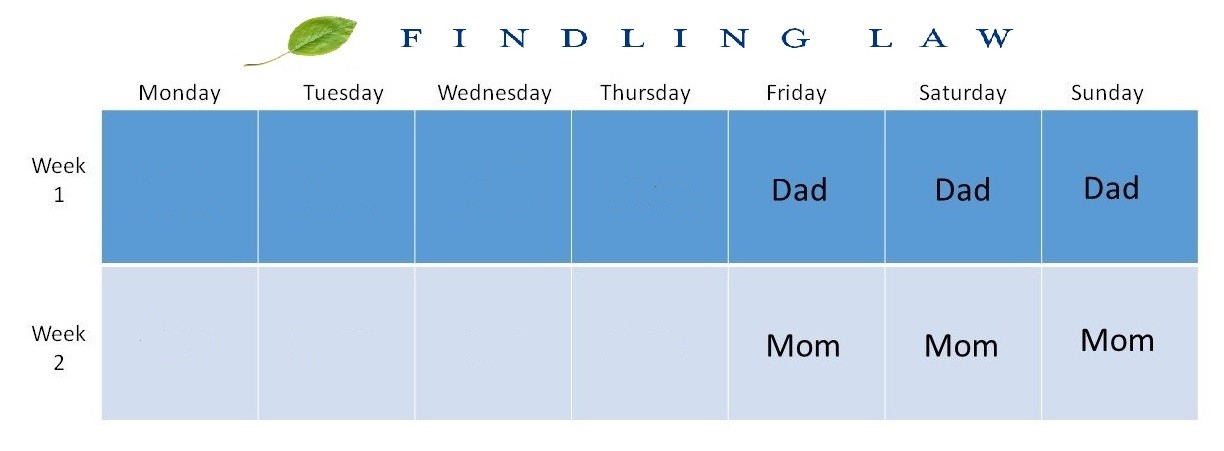 a two week rotation with parents alternating weekends. The Sunday overnight is optional.
a two week rotation with parents alternating weekends. The Sunday overnight is optional.
Parenting time in Michigan – The details
Parenting time is governed by the Child Custody Act of 1970 – MCL 722.27a, which provides in pertinent part that:
(1) Parenting time shall be granted in accordance with the best interests of the child. It is presumed to be in the best interests of a child for the child to have a strong relationship with both of his or her parents. Except as otherwise provided in this section, parenting time shall be granted to a parent in a frequency, duration, and type reasonably calculated to promote a strong relationship between the child and the parent granted parenting time.
The best interest of a child is a legal term of art used in both custody and parenting time cases. However, the parenting time statute provides a more detailed list of factors to be considered by the court such as:
(a) The existence of any special circumstances or needs of the child.
(b) Whether the child is a nursing child less than 6 months of age, or less than 1 year of age if the child receives substantial nutrition through nursing.
(c) The reasonable likelihood of abuse or neglect of the child during parenting time.
(d) The reasonable likelihood of abuse of a parent resulting from the exercise of parenting time.
(e) The inconvenience to, and burdensome impact or effect on, the child of traveling for purposes of parenting time.
(f) Whether a parent can reasonably be expected to exercise parenting time in accordance with the court order.
(g) Whether a parent has frequently failed to exercise reasonable parenting time.
(h) The threatened or actual detention of the child with the intent to retain or conceal the child from the other parent or from a third person who has legal custody. A custodial parent’s temporary residence with the child in a domestic violence shelter shall not be construed as evidence of the custodial parent’s intent to retain or conceal the child from the other parent.
(i) Any other relevant factors.
Michigan compiled laws section 722.27a (5) allow either party to ask for a specific schedule for reasonable parenting time in Michigan and MCL 722.27a( 6) clarifies the reasonable parenting time in Michigan terms, which can include the cost to transport the child, supervision, specific times, bond to insure compliance and reasonable notice if reasonable parenting time in Michigan is cancelled.
Sample 50-50 or equal schedules.
While there is no one size fits all answer to parenting time some common equal parenting time schedules are provided below. 50-50 or equal parenting time schedules take three common parenting time schedules.
The first equal parenting time schedule is alternating weeks.
The second equal parenting time schedule is a 2-2-5-5 schedule where one parent is awarded every Monday and Tuesday and the other parenting is awarded every Wednesday and Thursday.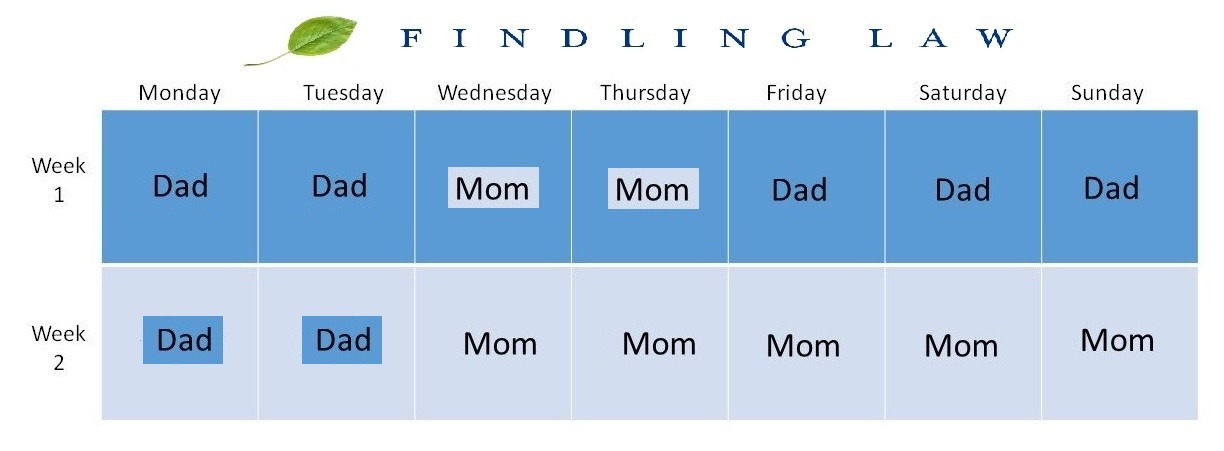
The third equal parenting time schedule is a 2-2-3 schedule where one the parents alternate Monday and Tuesday, alternate Wednesday and Thursday and alternate the weekends.
Sample traditional schedules.
Traditional parenting time schedules are not that traditional any longer. Notwithstanding, traditional parenting time schedules almost always start with alternating weekends which may (or may not include Sunday overnights).
The most traditional parenting time schedule was alternate weekends and a midweek overnight. In this example, dad is awarded every other Wednesday overnight and every other weekend.
Non-traditional work schedules and parenting time.
Certain occupations such as pilots or fireman have non-traditional work schedules. For example, it is not uncommon for a fireman to work several 24 hour shifts in a row followed by several days off. A common remedy to this problem is to create a 4 week parenting time schedule and modifying parenting time each month when the work schedule is published.
Summer parenting time schedule.
A common variation on the parenting time schedules provided above is to craft a unique parenting time schedule for the summer vs. the school year. For example, it is not uncommon to award one parent a traditional parenting time schedule such as every other weekend and one mid-week overnight during the school year and the other parent the exact same schedule during the summer months.
Since every family is unique a parenting time schedule should fit the needs of the family and the child(ren) in accordance with their best interest. We can help you formulate a parenting time schedule that is right for your family.
The statutory basis to modify parenting time is the same as custody, MCL 722.27(c), as the parenting time statute, MCL 722.27a, does not address modification. However, case law provides an important distinction between parenting time modifications that rise to a change in the established custodial
environment and parenting time that does not change the established
custodial environment.
A party establishes proper cause to revisit the condition if he or she demonstrates that there is an appropriate ground for taking legal action. The lesser, more flexible, understanding of “proper cause” or “change in circumstances” as set forth in the seminal threshold case on parenting time modification, Shade v. Wright .
The statutory basis to modify parenting time or visitation in Michigan is the same as custody and found in MCL 722.27(c) as the parenting time statute MCL 722.27a does not address modification. However, case law provides an important distinction between parenting time modifications that rise to a change in the established custodial environment and parenting time or visitation in Michigan that does not change the established custodial environment.
The proper cause or change of circumstances threshold requires a “change of circumstances” from the last parenting time order sufficient to have to revisit the issue. This threshold is similar to the requirement to change custody, however less stringent. Simply put, a change may not be sufficient to revisit custody but may be sufficient to revisit parenting time or visitation in Michigan. For example, a child who is changing starting a new school is probably not a material change in circumstance sufficient to revisit custody, but would likely be sufficient to modify parenting time. The process by which you request a modification of parenting time or visitation in Michigan is by filing a motion and arguing that circumstances have changed.
Once the threshold is met, a court can modify parenting time in accordance with the statue.
The Law – cases and statutes on parenting time / visitation in Michigan
Michigan Compiled Laws section 722.27(a) is the statutory law that governs visitation in Michigan and parenting time.
The statute begins by requiring that parenting time be granted in accordance with the best interest of the child. The “best interest factors” are the same factors that a court uses in deciding custody as set forth in Michigan compiled laws section 722.23.
A detailed explanation of the best interest factors can be found here. The Michigan divorce and family law parenting statute provides as follows: Michigan compiled laws section 722.27(a):
(1) Parenting time shall be granted In accordance with the best interest of the child.
(2) If the parties agree on a parenting time schedule, the court shall order unless the court determines on the record by clear and convincing evidence.
(3) Child shall have the right to visitation with a parent unless it is shown on the record by clear and convincing evidence that it would endanger the child’s physical, mental or emotional health.
(4) The court may consider the following factors when determining the frequency, duration, and type of visitation to be granted:
(a) Special circumstances or needs of the child;
(b) Whether the child is nursing;
(c) Reasonable likelihood of abuse or neglect of child during visitation;
(d) Reasonable likelihood of abuse or neglect of parent during visitation;
(e) The inconvenience to, and burdensome impact or effect on, the child travelling to and from visitation;
(f) Whether the visiting parent can reasonably be expected to exercise visitation in accordance with the court order;
(g) Whether the visiting parent has frequently failed to exercise reasonable visitation;
(h) The threatened or actual detention of a child with the intent to conceal the child from the other parent;
(i) Any other relevant factors factors.
Michigan compiled laws section 722.27a (5) further provides that: Visitation shall be granted in specific terms if requested by either party.
Modification law:
Modification case law:
Shade v. Wright, the Court of Appeals decided that normal life changes (e.g., child now in high school and changes in extra-curricular activity schedule are sufficient change of circumstances to modify parenting time, even if insufficient to warrant modification of custody.
When modification of a parenting time order does not alter the child’s established custodial environment, the “change in circumstances” requirement is less stringent because the concern of “providing a stable environment for children
that is free of unwarranted custody changes” is not implicated. Shade, 291 Mich. App. at 28–29. (Citation omitted).
Rains v. Rains, 301 Mich. App. 313, 340 (2013): Modifications of parenting time are not necessarily changes in custody. Changes in parenting time are distinct from changes in custody, and only if a change in parenting time would amount
to a change of the established custodial environment should the requirements to modify custody apply.
Kaeb v. Kaeb, 309 Mich. App. 556, 571 (2015): A party requesting a change to an existing condition on the exercise of parenting time must demonstrate proper cause or a change in circumstances that would justify a trial court’s determination
that the condition in its current form no longer serves the child’s best interests. “Proper cause” should be construed according to its ordinary understanding when applied to a request to change a condition on parenting time. That is, a party establishes proper cause to revisit the condition if he or she demonstrates that there is an appropriate ground for taking legal action. The lesser, more flexible, understanding of “proper cause” or “change in circumstances” as set forth in
Shade v. Wright should apply to a request to modify or amend a condition on parenting time.
Vodvarka v Grassmeyer, 259 Mich App. 499 (2003): [I]n order to establish a ‘change in circumstances’ a parent must prove that since the last custody order, the conditions surrounding custody of the child, which could have a significant effect on the child’s well being, have materially changed.
Grandparent time statute.
MCL 722.27b. In simple terms, grandparent time is awarded if denying the time creates a substantial risk of harm to the child’s mental, physical or emotional health. (See. MCL 722.27b(4)(b).)
Grandparent time law.
The new Michigan law regarding grandparent time is found in MCL 722.27b. In simple terms, grandparent time is awarded if denying the time creates a substantial risk of harm to the child’s mental, physical or emotional health. (See. MCL 722.27b(4)(b).)
Troxel v. Granville, 530 US 57 (2000), defined a fit parent as a parent who “adequately cares for his or her children.” which led to the determination that Michigan’s old grandparent time statute was unconstitutional. (See: DeRose v. DeRose, 469 Mich. 320 (2003)).
In Re: Sanders, 495 Mich. 394 (2014), parents have a constitutionally protected right to make decisions about the care, custody, and management of their children.
Geering v. King et. al., Mich. App. No. 335794, the trial court made a determination that the biological parents were unfit and that grandparent time was in the children’s best interest notwithstanding the biological parent’s objections. The Michigan Court of Appeals reversed.
Brinkley v. Brinkley, 277 Mich. App 23 (2007) “. . . if two fit parents . . . both oppose visitation, their joint opposition effectively creates an irrebuttable presumption that denial of grandparent time will not create a substantial risk of harm.
Parenting time Articles (visitation) in Michigan
Parenting time schedules in a Michigan divorce.
Michigan parenting time and the child’s birthday
Reasonable parenting time in Michigan
Michigan Child Custody, Child Support and Parenting Time (Visitation) video
Michigan parenting time and the child’s birthday
Holiday Parenting Time in Michigan
Reasonable parenting time in Michigan
Moving with children video (Changing domicile and Michigan divorce)
Christmas parenting time (visitation) after divorce?
Additional Resources
By: Daniel Findling (updated: 2019) The Divorce Guy, Michigan Divorce Attorneys and Specialists
248-399-3300
877-YOUR FIRM

